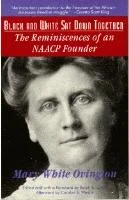Black and White Sat Down Together
Black and White Sat Down Together
Mary White Ovington
Mary White Ovington, a white settlement worker, describes her pivotal role in the founding of the NAACP.
Paperback Edition
ISBN: 9781558611566
Publication Date: 09-01-1996
Edited by Ralph E. Luker
Afterword by Carolyn E. Wedin
Available for the first time in book form, this is the courageous story of a woman who defied social restrictions to co-found the NAACP and to remain in the group’s inner circle through its first forty years. Ovington recounts her association with such figures as W.E.B. DuBois, Booker T. Washington, and James Weldon Johnson, and describes her experiences organizing NAACP chapters in California, the Midwest, and the deep South.
“Ovington’s memoirs provide a rare glimpse into the rich history of the NAACP. That one of the founders of this pivotal group was a woman, and a white woman at that, highlights relations between gender and power as well as those between race and power. . . . The story of the woman who became ‘chairman’ of the most influential civil rights organization in the history of the United States, who traveled back and forth across the country to make speeches about racial equality, is a story worth hearing. . . . The publication of these reminiscences fills a gap both in black history and women’s writing; keeps open the conversations on race, gender, and class; and gives us all something to celebrate.” —Wilson Library Bulletin
“Historians . . . reassessing the role of the NAACP in the U.S. civil rights struggle . . . and lovers of history and biography will be glad these Depression-era reminiscences of the Euramerican woman most deeply involved with the NAACP from its 1909 formation until her death in 1951 have been rescued from the archives of the Baltimore Afro-American, where they appeared in 1932-33.” —Booklist (starred review)
“An intriguing memoir, remarkable as much for what it doesn’t reveal as what it does. . . . The Feminist Press deserves credit for beginning the process of recovering the complete picture of Ovington’s career.” —Women’s Review of Books






